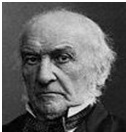|
 |
|
 |
|
|
||
George Cadbury Leadership
George Cadbury (1839-1922)
With his brother, Richard, George (pictured right) took over the famous, but then failing, British chocolate business in 1861 from its founder, his father, John Cadbury. They made it into a very profitable business.
Why was he a great leader?
1. Christian beliefs Like the rest of his family, he was a Quaker and had very strong Christian beliefs, particularly to serve God and help other people. This is why he:
In good times and bad he always followed his Quaker principles and taught children at Sunday school, even when he was rich and a very busy businessman. He hated war and strongly opposed the First World War, despite strong criticism.
2. Great employees He strongly believed that happy and healthy employees are essential to a successful business. So, he built Bourneville (pictured right), near Birmingham, in 1879, a village for his employees with schools, hospitals and houses far better than those of workers elsewhere. He encouraged employees to take part in sport to keep them fit.
3. Pragmatic, open-minded and empathetic Despite his strong Quaker belief in teetotalism, he thought the pub was an understandable escape from their dreadful living conditions. George:
“Men do not want to be patronized. They want justice”, he said.
4. Benevolent paternalism He was extremely kind (or benevolent) to his employees. But he was the boss: people did what he said.
5. Marketing imagination He realized his company would not succeed without customer satisfaction. So he continually thought of new products to keep his customers happy. In 1866 he sold cocoa as a drink for the first time in Britain and in 1905 Cadbury’s dairy milk chocolate (pictured right) was launched.
6. Emotional intelligence He was great with people, because of
7. Reflection with conscience and duty During walks and other quiet times, he thought about the right thing to do, what he called the “inner light”, or his conscience, telling him what God wanted him to do. This gave him an enormous sense of duty to lead the best possible life. Regular exercise improved his thinking
8. Social responsibility He was horrified by the living conditions of working people. So he:
He was deeply concerned about how well businesses treated their employees and gave away lots of his money to charity. His favourite saying was that no one, who fulfils their obligations to others, will be rich.
9. Ideals mixed with reality He wanted people to lead happy lives, and was deeply concerned about how businesses affect them. For example, he saw the danger of machinery to people’s fulfilment at work. But he also realized that machinery was a necessary evil for successful business, and so had to be made as worker-friendly as possible. “Machinery creates wealth but destroys men”, he said.
10. Vision with caution He was driven by his vision of a better world, and he worked incredibly hard to achieve it, despite the tragic death of his wife in 1887. But he also paid great attention to detail and was cautious in business, if necessary.
Key quote on ethics What is the good of having principles, unless you are prepared to suffer for them?
Key quote on motivation Machinery creates wealth but destroys men.
Key quote on human resource management Men do not want to be patronized. They want justice.
Key quote on God and religion The rich man can enter [the kingdom of heaven], if he will humble himself before God. |
|
|
||
|
|
||
| Copyright © wisdomtowin.com 2025 All Rights Reserved | ||
|






